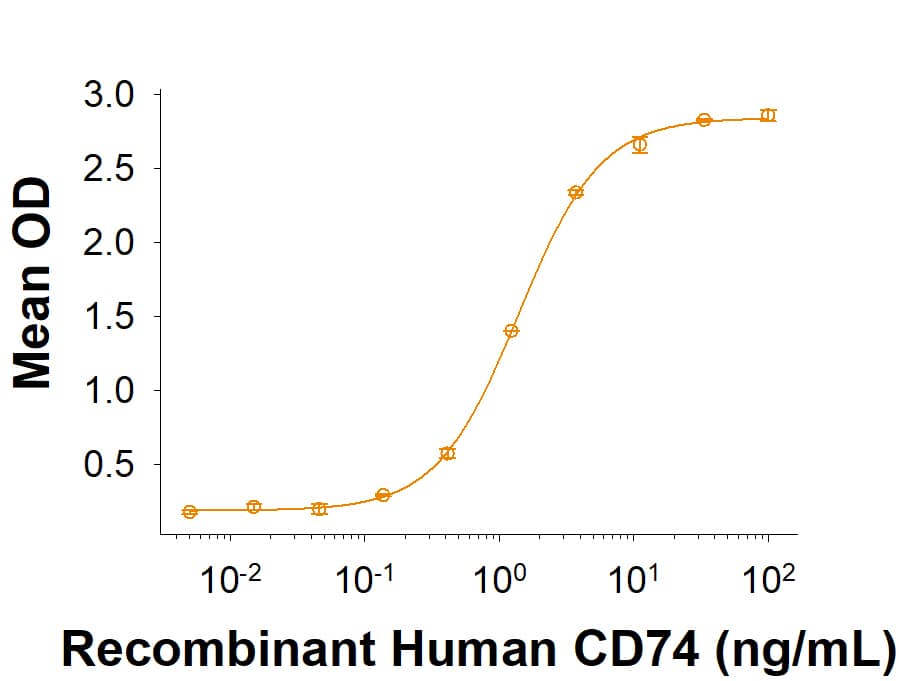Recombinant Human CD74 Protein, CF
R&D Systems, part of Bio-Techne | Catalog # 3590-CDB

Key Product Details
Product Specifications
Source
Chinese Hamster Ovary cell line, CHO-derived human CD74 protein
Gln73-Met232, with an N-terminal HA (YPYDVPDYA) tag
Gln73-Met232, with an N-terminal HA (YPYDVPDYA) tag
Purity
>90%, by SDS-PAGE visualized with Silver Staining and quantitative densitometry by Coomassie® Blue Staining.
Endotoxin Level
0.10 EU per 1 μg of the protein by the LAL method.
N-terminal Sequence Analysis
Tyr (of HA tag)
Predicted Molecular Mass
19 kDa
SDS-PAGE
25-33 kDa, under reducing conditions.
Activity
Measured by its binding ability in a functional ELISA.
Recombinant Human CD74 (Catalog # 3590-CDB) binds to Human CD74 Antibody (Catalog # AF3590) with an ED50 of 0.300-3.60 ng/mL.
Recombinant Human CD74 (Catalog # 3590-CDB) binds to Human CD74 Antibody (Catalog # AF3590) with an ED50 of 0.300-3.60 ng/mL.
Scientific Data Images for Recombinant Human CD74 Protein, CF
Recombinant Human CD74 Protein Binding Activity.
Measured by its binding ability in a functional ELISA. Recombinant Human CD74 (Catalog # 3590-CDB) binds to Human CD74 Antibody (Catalog # AF3590) with an ED50 of 0.300-3.60 ng/mL.Recombinant Human CD74 Protein SDS-PAGE.
2 μg/lane of Recombinant Human CD74 Protein (Catalog # 3590-CDB) was resolved with SDS-PAGE under reducing (R) condition and visualized by Coomassie® Blue staining, showing bands at 25-33 kDa.Formulation, Preparation and Storage
3590-CDB
| Formulation | Lyophilized from a 0.2 μm filtered solution in PBS with Trehalose. |
| Reconstitution | Reconstitute at 250 μg/mL in water. |
| Shipping | The product is shipped at ambient temperature. Upon receipt, store it immediately at the temperature recommended below. |
| Stability & Storage | Use a manual defrost freezer and avoid repeated freeze-thaw cycles.
|
Background: CD74
References
- Beswick, E.J. and V.E. Reyes (2009) World J. Gastroenterol. 15:2855.
- Claesson, L. et al. (1983) Proc. Natl. Acad. Sci. 80:7395.
- Strubin, M. et al. (1984) EMBO J. 3:869.
- Strubin, M. et al. (1986) EMBO J. 5:3483.
- Riberdy, J.M. et al. (1992) Nature 360:474.
- Koch, N. et al. (1991) J. Immunol. 147:2643.
- Roche, P.A. et al. (1991) Nature 354:392.
- Leng, L. et al. (2003) J. Exp. Med. 197:1467.
- Takahashi, K. et al. (2009) Respir. Res. 10:33.
- Heinrichs, D. et al. (2011) Proc. Natl. Acad. Sci. 104:17444.
- Shi, X. et al. (2006) Immunity 25:595.
- Gore, Y. et al. (2008) J. Biol. Chem. 283:2784.
- Veillat, V. et al. (2010) J. Clin. Endocrinol. Metab. 95:E403.
- Bryan, K.J. et al. (2008) Mol. Neurodegen. 3:13.
- Martin-Ventura, J.L. et al. (2009) Cardiovasc. Res. 83:586.
- Liu, Y.-H. et al. (2008) J. Immunol. 181:6584.
Alternate Names
CD74, CLIP, DHLAG, HLADG, Ia-gamma, INVG34
Gene Symbol
CD74
UniProt
Additional CD74 Products
Product Documents for Recombinant Human CD74 Protein, CF
Product Specific Notices for Recombinant Human CD74 Protein, CF
For research use only
